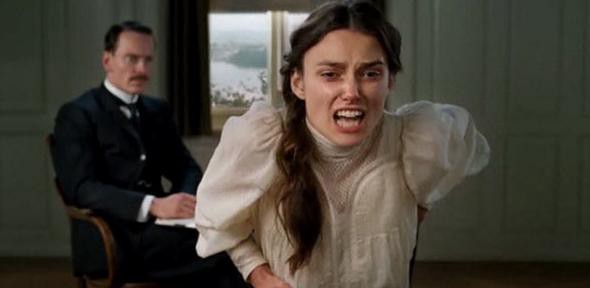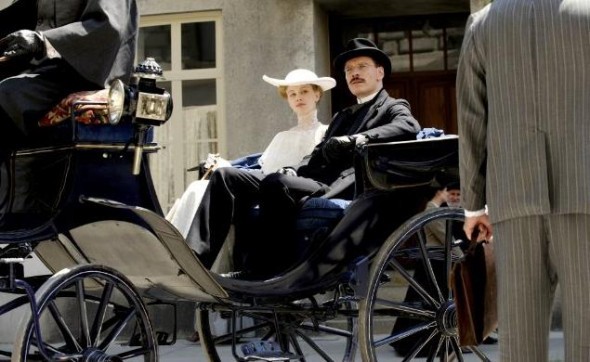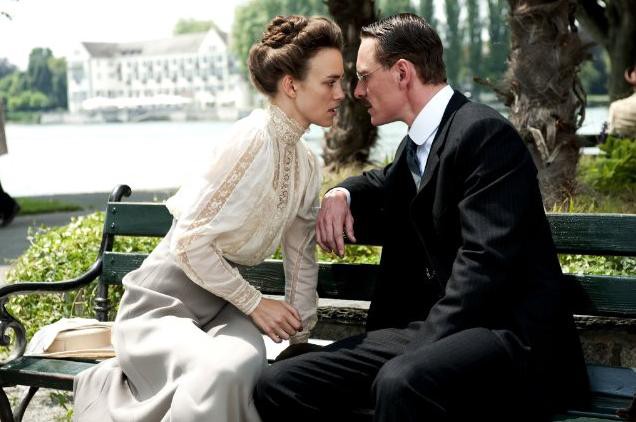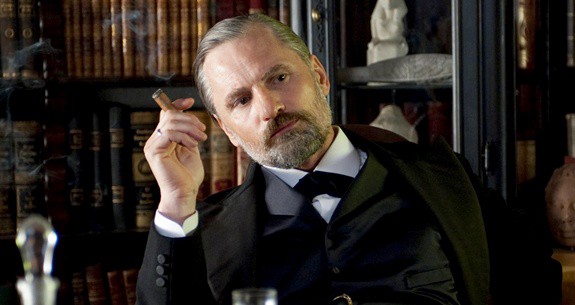Cronenberg's 'A Dangerous Method': The Way We Rut Now
by Maria Bustillos and David Roth

David Roth: A film about Sigmund Freud and Carl Jung and ostensibly weird sex, from a director who has spent his career making films about how terrified/fascinated/aroused/disgusted/disgusto-roused humans are by their bodies and what they do and the horrible things that come out of them. So why, Maria Bustillos, would the two things I remember most from A Dangerous Method be 1) how cruel my female friends were about Keira Knightley’s breasts and 2) the nagging question of whether David Cronenberg is trying to make interesting movies anymore?
Maria Bustillos: A film worth seeing, I thought — though not one worth talking about until after, so I’m glad we waited. I suspect that Cronenberg is going for “edgy” more than interesting. But the ethical underpinnings here are vanilla in the extreme. (Also: it is always refreshing to see a woman in a movie who hasn’t been made to look like a Bratz doll.)
DR: It’s just strange to get something this stodgy from the guy who spent his first two decades of movie-making finding new ways to turn teeth into guns that, like, shoot penises at people. That dude is now the guy who made a movie in which Freud, whose turf he has been working for decades, actually appears as a character, but which is also somehow totally free of any actual perversity or perversion or life.
MB: So you liked it, then.
DR: Eh, more than I’m letting on, I guess. I felt some feelings at the end, surprisingly, and I’d definitely rather watch a movie about psychoanalysis and its discontents than watch a rich-people-get-sad opus like The Descendants. But mostly I kind of thought it was inert and crummy-looking and pretty silly and abstract in the way it dealt with sex and sexual guilt. Sexual gilt, I almost wrote. It’s kind of amazing how, given that Freud is a character in the film and author of the idea that everything we think, feel and do is based on some reaction to our feelings about our genitals, their output and/or poop, how clean it all was.
MB: Well, that was the idea, maybe? They’d been hiding the dirt, before.
DR: It’s just that they even when they got dirty, they didn’t get dirty. Okay, the movie is, spoiler/diligence alert, about a conflicted psychiatrist (named Carl Jung, looks like Michael Fassbender) dipping out on his pregnant wife to spank/hump a brilliant patient named Sabina Spielrein (played by the lovely and pointy actress Keira Knightley) who rattles his saber, and how that experience leads him to fall out with his idol, who is the father of psychoanalysis, who is Sigmund Freud and who is played, because of course he would be, by Viggo Mortensen. There is spanking and humping and conflict, but everyone is so meticulously (and constantly) costumed, and there’s zero sense of place — lots of horse-and-buggy action on brightly lit, cleanly scrubbed streets, with like two parasol’ed extras walking around in the background. That and those super-upholstered living rooms.

MB: I thought the claustrophobia in this was deliberate, for what that’s worth. The beautiful lustre of these objects, furniture, horses, people, was meant to be like the public face of things: underneath, the corsets and the spanking. The real, so-called “dangerous” part, like a siren song. Though Miss Knightley appears to have modeled the early bits of her performance on the monster in Alien. I almost expected extra sets of jaws to come out of there.
DR: Man, that mandible. When she gets that chin-jut popping it’s some H.R. Giger shit for real.
MB: They were definitely going for a vagina dentata thing, I thought, didn’t you?
DR: Yeah, her teeth — imperfect teeth, improbably — get a lot of play.
MB: They be snappin’. Really, the whole movie is about her mouth. The Truth is In There. (By the way, German “spiel” = “to play,” “rein” = “pure, chaste, uncorrupted,” interestingly.)
DR: The relentless Freudian tooth-play was, to me, one of very few Old Interesting Cronenberg things in the movie. The new, soundstage-y, Everything Just Looks Really Canadian Cronenberg did the rest.
MB: Maybe the teeth are the danger, and that is why one must safely plow the fertile fields of Madame instead. The wee wifey who Doesn’t Want to Know. So creamy, so rich, so sumptuously bedecked. She is like a walking confection, especially at first.
Presumably there is so much fuckpower in a chaste, chilly forehead kiss from Michael Fassbender that it can cause spontaneous reproduction.
DR: Ah, the poor wife. How she keeps getting pregnant is one of the movie’s great mysteries. Presumably there is so much fuckpower in a chaste, chilly forehead kiss from Michael Fassbender that it can cause spontaneous reproduction. Of course, his actual sex scenes weren’t appreciably more engaged.
MB: I loved the way these gorgeously-attired specimens would be so distantly intoning this and that about “were you masturbating,” and whatnot. I thought it was what they were trying to get at, really, how you can keep “civilization” intact in the face of these uncontrollable forces. But that didn’t quite work out.
Because yes, I did not get the idea that Fassbender’s Jung was in the throes of sexual obsession, not really.
DR: It’s that mustache. He has a chipmunk sleeping under his nose all movie.
MB: Wake up, Alvin!
DR: Hard to convey heatedness with that drowsing animal up there.

MB: But in contrast to what we heard from Choire last week though, the male lead in the movie managed to consummate, finally. Bravo, Fassbender!
DR: I’m going to find him and fist-bump him. “Bro: nice one.”
MB: Oh, man.
DR: That big set-piece sex scene was interesting in that they were both clothed, I guess. As was presumably the convention at the time. In England, they wouldn’t even have been in the same room.
MB: He is dressed all the time, yes. I can’t imagine that skin-hunger would have been any different, but okay. I suppose that, for him, we’re meant to think that this may be coitus but it is not a physical matter, I reckon. It’s an intellectual penetration, an investigation — here she’s been telling all these strange truths — rather than the kind of ecstatic renunciation of self that we hear about later, but from her, and it comes as a surprise to the menfolk. So this is all deliberate.
But it’s also right where Cronenberg loses me, because he seems to believe that the physical world really is filthy and degraded, cf. The Fly, though in this movie he opposes the filth with this cerebralized non-romance. Which is just as bonkers in its own way, as that “naughty,” “dirty” thing. Equating filth, lust, the physical plus, in this case, insatiable curiosity and the irresistible desire to lift the rug. What do you think about this, equating the irresistibility of curiosity with the erotic impulse?
DR: I think I could’ve gone along with it if I’d gotten the sense that anyone was ever actually turned-on. Besides Keira, who is very twitchy but I guess does at least seem to be enjoying herself. But if Jung had turned to the camera and said, “Fascinating, really” during any of the sex scenes, it wouldn’t really have been all that jarring.
MB: My dissatisfaction with the movie and with Cronenberg’s work generally is rooted in this really flat duality, where the only truth is the “unconventional” one. For reals I could have done with more of the tormented history of psychoanalysis and less of the sexual-gilt (!).
DR: Especially because, for a movie that’s being sold in part for its sex, it manages to whiff on both what’s fun and scary about wanting and not-wanting-to-want. In A History of Violence, which I thought was total puffed-up, pretensio graphic-novel doofiness, there are these two weirdly intimate and jarringly natural sex scenes that are the only emotionally authentic moments in the film; something like that would’ve helped so much, here, just in terms of perking everyone up and puncturing the Masterpiece Theatre vibe. Instead, there’s no sense of lust (or what’s fun about it) and no real sense of the stakes for the people involved. Which, to reiterate, are a rich Aryan doctor in 190-whatever Switzerland and his patient/spank-bud, a younger unmarried Jewish woman. So it’s a biggish thing to miss.
MB: They never get that right, the shame. We have a sense of the sordid, but in order to get to the shame you have to have some real conviction of what the sordidness has betrayed. Plus, they missed on the eroticism part, the sense of it is just the two of us in our own world. It was almost like the spanking was part of her treatment, a way to “help,” which really kind of gnarled me a bit, how detached and clinical it seemed, when it was also supposed to symbolize The Fall, in another way. I say this though I am an Ibsenist through and through. But without a sense of the sacred, there can’t be shame.
DR: I agree with that, but because this is supposed to be a good and more to the point intriguingly weird filmmaker — not some costume-y doofus, but a guy who spent the first two decades of his career basically taking Freud-o nightmares on film and having them chase a hungover Oliver Reed around — I had to wonder if some of that wasn’t intentional? To what degree do you think the incredible, high-collar artificiality of the movie was conscious?
MB: I got the impression it was like, look how much effort these people expended on sanitizing our inescapable physicality, lust, decay etc. Hiding reality under this glossy veneer. The story we were expected to see, I think, was that the guy Gross…
DR: Ah, Otto Gross. Vincent Cassel just Vincent Cassel-ing everything in sight. Same turtleneck sweater in all of his scenes, definite sense that he smells like coke-mouth and onions and older ashtrays.
The only way you can tell that Fassbender has reached the summit of ecstasy is that he looks a little worried.
MB: … yikes, right, that this seductive, no-brakes character understood better than Jung did that Freud’s technique, here called just the “talking cure,” would open up myriad temptations, drag the doctor into experiencing the world through the patient’s eyes or rather, through her mind. The truth, right? These “sick” people are closer to the truth, we’re being told, I thought. “Facing reality.” In this way, Jung would be tempted into the real world and away from the falsely clean, aestheticized Victorian Potemkin Village ’n’ Gift Shoppe. The real world will surely drive you mad — you’ll have lust, you will no longer be creamy and correct, you’ll feel pain and get dirty and be a naughty, naughty boy. “Civilization” being a purely artificial, pasteboard confection behind which is the real sweating, violent, lusting mud and blood reality, or something like that.
MB: The trouble is, I have little sympathy for these views, they seem kind of adolescent to me. I go in for more like both/and, not either/or. An alchemical balance is what gets us closer to reality, and to peace, not some crazy dichotomy of like filth/sex vs. cleanliness/chastity.
DR: And whose dualities are those, anymore? Many people, I guess, but this movie’s audience’s? I can believe that sexuality was a far scarier and less extravagantly commodified thing than it is now, but what are we learning or feeling about sex from a movie that’s so heatedly scientific in talking about sex, and so fucking buttoned-up once it finally gets down to it? The degradation stuff — there’s a lot of mud and trembling crazyface shame from Keira K. — is cartoon, but the actual exalted/enjoyable aspects of it are so distant.
MB: The movie did not even begin to fathom the idea of exaltation of any variety at all.
DR: It doesn’t just leave its socks on, it leaves its pants and suspenders and shirt and fucking borsalino on. It loosens its tie.
MB: Gets off, but just barely. The only way you can tell that Fassbender has reached the summit of ecstasy is that he looks a little worried.
DR: Immediately looks around and begins small-talk. “What a lovely lamp.”
MB: “Is that Michelin lace on your pantaloons?”
DR: Everyone is either thinking about lunch or experiencing orgasm.
MB: Not both, surely?
DR: “Arby’s superfan Michael Fassbender was arrested again today…”
MB: Another thing, a significant thing, is that bits of the story are historically accurate but there is no real indication anywhere about the spanking and whatnot, nor is there even absolute confirmation that Spielrein and Jung were lovers. It is a little disingenuous to mix it up this way, as the director and actors have even been doing in interviews and stuff.
DR: The movie also seems kind of hilariously unfair to Mortenson-as-Freud. It’s one thing to take the handsomest dude out, put a fake nose (I think?) on him, give him some plummy European Person Accent, and have him analyze someone else’s dreams from behind a cigar all movie. It’s a silly thing, given how much more complicated a human he must have been, but that’s one thing. It’s another to turn him into this paranoid prig. Which he may well have been, but I just have to imagine he was a lot more interesting in how he was angry.

MB: He turned out to be this complete cipher! Whereas the real Freud was forever emoting and raging and sliding to the floor in a faint. Though to give Cronenberg credit, the movie does kind of glance at the impossibility of having literally everything be about sex, how difficult this made things for the early psychoanalysts. And even now, there are still all these factions; the early schisms have never been resolved completely.
DR: It’s also odd that what they make Freud seem petty about is a perceived anti-Semitism. He gives Keira some real-talk, can’t-trust-a-gentile spiel, which is funny because it is the two handsomest and least-Jewish-looking people on earth having the just-between-us-Jews talk, but which was also a miss in that the movie never examined whether or not he was actually right. Without context, it makes Freud look small and paranoid and a bit of a bigot. But given Jung later in life associations with some very anti-Jewish people (however passive or overblown those were, they’re still a part of his story), it would seem worth mentioning.
MB: I thought so, too, about the small-mindedness of Freud. That was where they really started missing the boat.
DR: And what a missed opportunity that is. Because Freud, even in context, is WAY out of context. Just ideas from nowhere at that point.
MB: Here the guy had just found an ocean, or like, a planet, that had been right in front of everyone, and he was really the first one to see it. There was NO sense of this. (By the bye, I do recommend Ernest Becker’s Denial of Death if you want a clearer account of what happened between Freud, Jung, Adler, Rank & co., plus Becker is practically the greatest genius of the 20th c.)
DR: And Jung, too, breaking with that, was very bold. That’s a big and interesting story, albeit one with less spanking.
DR: The letters that take up like 20% of the film’s dialogue were the actual letters between the three, I think. And those are good. Certainly they’re the things that come closest to delivering the goods on what must have been a very complex relationship/rivalry/friendship between Jung and Freud.
MB: Really, I didn’t know. The paper, the ink, the language, the writing. Very beautiful. Here is the means by which these people were able to insulate themselves from the crazy shit they were talking about.
DR: I think we can agree that this is, if nothing else, an incredibly well-insulated movie. I think maybe, if we wanted to get at Sexual Intercourse and Its Discontents, we should’ve seen Shame.
Maria Bustillos is the author of Dorkismo and Act Like a Gentleman, Think Like a Woman.
David Roth writes “The Mercy Rule” column at Vice, co-writes the Wall Street Journal’s Daily Fix, and is one of the founders of The Classical. He also has his own little website. And he tweets inanities!
